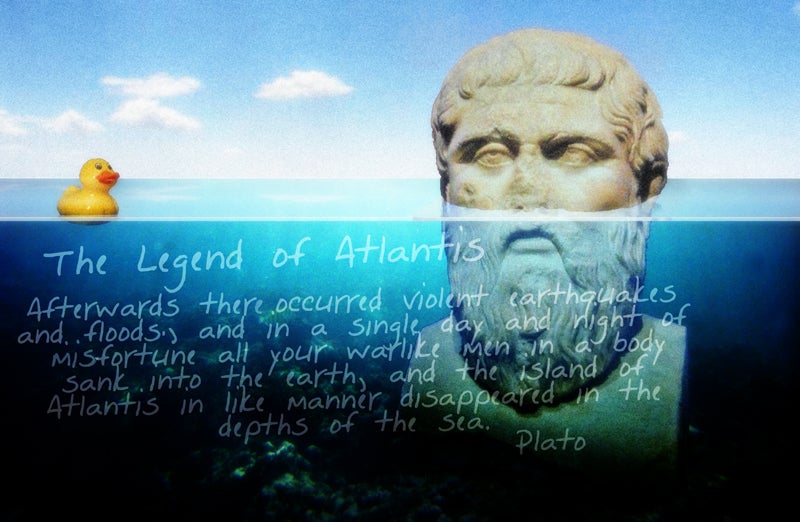Bettany Hughes brings Atlantis to the surface in style

Your support helps us to tell the story
From reproductive rights to climate change to Big Tech, The Independent is on the ground when the story is developing. Whether it's investigating the financials of Elon Musk's pro-Trump PAC or producing our latest documentary, 'The A Word', which shines a light on the American women fighting for reproductive rights, we know how important it is to parse out the facts from the messaging.
At such a critical moment in US history, we need reporters on the ground. Your donation allows us to keep sending journalists to speak to both sides of the story.
The Independent is trusted by Americans across the entire political spectrum. And unlike many other quality news outlets, we choose not to lock Americans out of our reporting and analysis with paywalls. We believe quality journalism should be available to everyone, paid for by those who can afford it.
Your support makes all the difference.“From the moment Atlantis was set down in Athens,” says Bettany Hughes, “it has never once left the human radar.” In 'Atlantis – The Evidence, an hour-long Timewatch special aired last night on BBC Two, renowned classical historian Hughes grapples with a legend that has baffled and fascinated us for thousands of years. Far from an ancient wives' tale, was Greek philosopher Plato's Atlantis based on a real-life civilisation, which suffered an awful fate at the hands of mother nature?
First off Hughes lists the myriad crackpot theories that have both served to fuel the flames of public interest, and demolish any sense of archaeological credibility surrounding the tale. We're shown Eric Von Daniken, and his 'wizards from outer space', British PM William Gladstone's attempted voyage to Tibet and the Nazis' macabre quest for the Aryan race.
Hughes, however, sees echoes of the Atlantis myth in Thera, better known today as Santorini: an ancient volcanic island in Greece which fell to a gigantic volcanic eruption around 1650 BC. Stunning shots of the island show how Thera's topography resembles that of Plato's Atlantis, while Hughes' approachable manner and unflinching austerity means her point isn't lost, like so many modern documentaries, in a flood of high-octane hyperbole.
Hughes dismantles the Atlantis myth stage-by-stage, first by getting a VIP look at artefacts being excavated from Thera today which show the splendour of a great nation, wiped out by a disaster ten times the size of Vesuvius. First discovered in 1967 this 'Pompeii of the Aegean' could be the great maritime city-state Plato mentions. “It is a buried city that is slowly being brought back to life,” says Hughes. However the historian in her is never far from the storyteller, and she's quick to note her evidence is circumstantial, if compelling.
But while Thera's own Bronze Age inhabitants are being kept largely under wraps, Crete's are a bona fide tourist attraction. Hughes travels to the hallowed Palace of Knossos, a great ancient complex unearthed by Arthur Evans, who saw fit to recreate it. Colin MacDonald, former curator at Knossos, explains how prosperous and cultured this civilisation, dubbed the Minoans after the legend of King Minos and his labyrinth, became before suffering at the hands of Thera's great eruption. 1650 BC Crete, we're told, would have loosely resembled Sri Lanka following the Boxing Day Tsunami.
As well as Hughes' disarming persona, the show happily fails to suffer any documentary pitfalls. We're not inundated with reams of pointless B-roll; experts are succinct and believable; and cut-scenes, whilst shot in 300-esqe chrome, do not steal any thunder from the history. Instead they show the greatness of the Minoans, their odd obsession with 'bull-leaping' and the terror of a people running from an inescapable fate.
Hughes inspects underwater archaeology and geology for signs of pumice strewn across the region – a sure sign of the eruption, while the murkier aspects of Plato's story are handed over to British Museum expert Dr Irving Finkel, who agrees Atlantis could have been based on the handed-down knowledge of the Theran eruption. Overall this is a must-see for anyone interested in classical history, let alone Atlantis. And while Hughes admits she “still wants to see the evidence in black and white,” this show just might be the next best thing.
The Knossos Palace: Discovery and Renovation
Top 10 Minoan Treasures to See at the British Museum
The Minoan Civilisation: Is their Empire of Trade and Art Atlantis?
Join our commenting forum
Join thought-provoking conversations, follow other Independent readers and see their replies
Comments